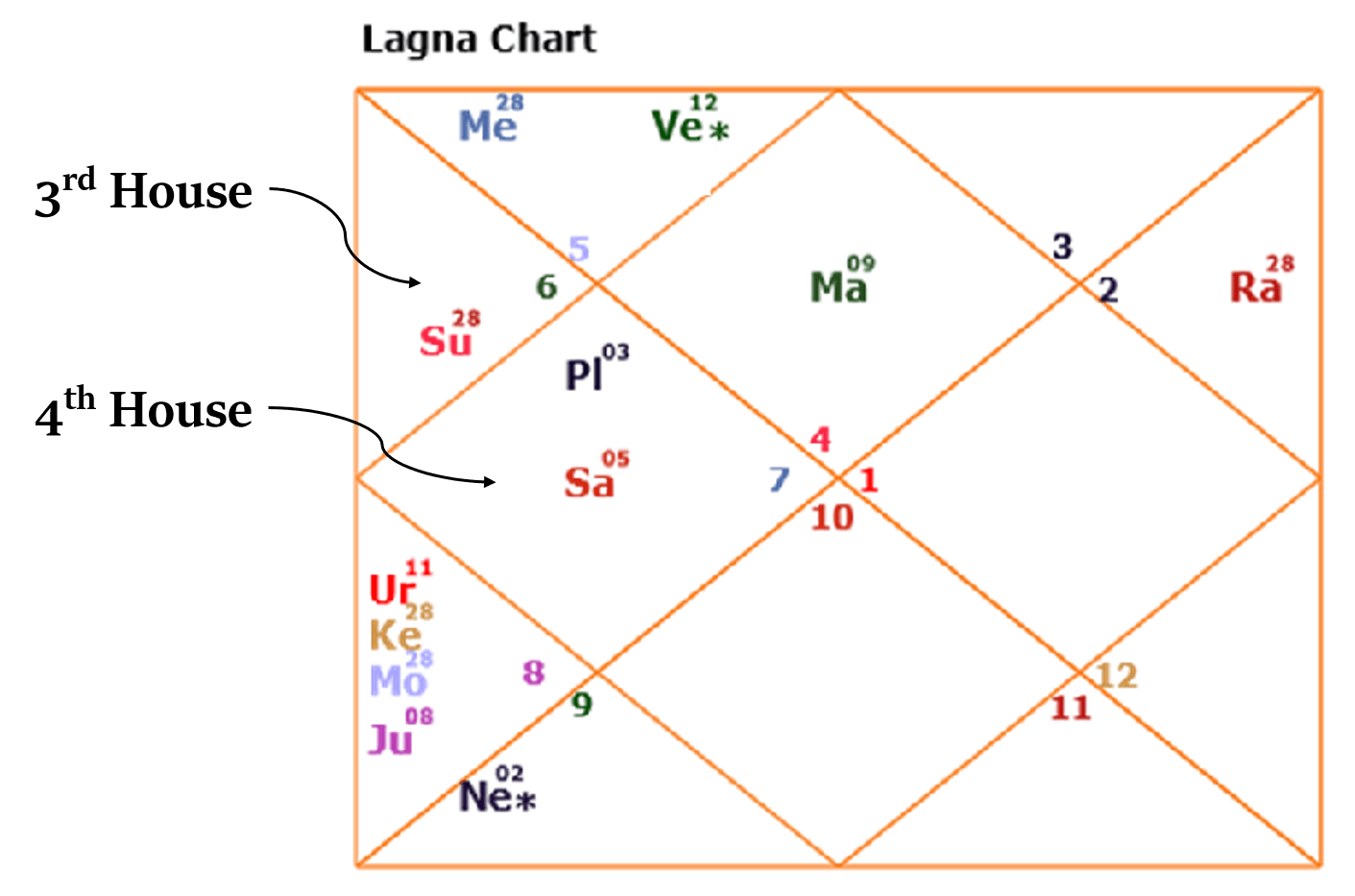Effect of Sun on other Planets in Astrology
In this article, we will study how Sun affects other planets that are sitting in the same house or adjacent houses of the kundali, as the Sun itself.
 Note
NoteIn previous articles, you were introduced to the basic rules of Lagna Kundali. If you haven’t read that, you may start by reading the basics of lagna kundali in this article.
That article also tells you how we count houses in a kundali - a knowledge you need to have to understand this article. However, we are also attaching below a snapshot of a blank kundali with its house numbers marked, just for your reference. House numbers remain the same for all North Indian kundalis.

 Table of Contents
Table of Contents- What is Planet Setting?
- Which Planets can be set by the Sun?
- Effect of the setting of a Planet
What is Planet Setting?
Many planets, if they come too close to the Sun, are overpowered by it, and lose all their power. Such planets are considered to be setting (just like the Sun sets).
But what do we consider as too close to the Sun?
Well, for this we need to compare the degrees of the Sun and the planet that is sitting with the Sun in the same house or one house ahead/behind it. If their degrees are close, then it means that the planet has been overpowered by the Sun, and is setting.
However, not all planets can be overshadowed by the Sun. Let’s learn which planets are affected by this phenomenon, and which ones are immune to it.
Which Planets can be set by the Sun?
These planets can be overpowered by the Sun – Jupiter, Venus, Saturn, Mercury, Moon, Mars. However, Rahu and Ketu cannot be set by the Sun, as these are shadow planets – basically they are ascending and descending phases of the Moon. On the contrary, Rahu and Ketu can eclipse the Sun and the Moon.
Also, though the Sun can set other planets, it never sets itself.
How close a planet needs to be to the Sun, to be considered as set, also varies.
- Moon sitting with the Sun, will be considered set if the difference between the degrees of the Sun and the Moon is equal to or less than 12°.
- Mars sitting with the Sun, will be considered set if the difference between the degrees of the Sun and the Mars is equal to or less than 17°.
- Jupiter sitting with the Sun, will be considered set if the difference between the degrees of the Sun and the Jupiter is equal to or less than 11°.
- Venus sitting with the Sun, will be considered set if the difference between the degrees of the Sun and the Venus is equal to or less than 9°.
- Saturn sitting with the Sun, will be considered set if the difference between the degrees of the Sun and the Saturn is equal to or less than 15°.
- Mercury sitting with the Sun, will be considered set if the difference between the degrees of the Sun and the Mercury is equal to or less than 13°. You will often find Mercury sitting in the same house as the Sun, or an adjacent house. So, Mercury is probably a planet that is most affected by this phenomenon.
 Concept of Degrees in Kundali
Concept of Degrees in KundaliThere are 12 houses in a kundali. And a full circle has 360° degrees. So, there are 360°/12 = 30° degrees in every house of a kundali.
If a planet has 8°, then it means that it has travelled 8° in the house it is sitting. It has still 30° – 8° = 22° left to cover in that house, before moving on to the next house.
Planets move from 1st house to the 2nd, and then to the 3rd, and so on, as represented in the kundali given below:

After the 12th house, a planet will move on to the 1st house.
However, Rahu and Ketu move in opposite direction. That is, Rahu and ketu are always retrograde in their movement.
Let’s see an example. In the Kundali given below, Sun is in the 2nd house (with 0°), along with Venus and Mercury.

- The difference between the degrees of the Sun and Mercury = 28 – 0 = 28°. This is more than 13°. So, Mercury is not setting.
- The difference between the degrees of the Sun and Venus = 12 – 0 = 12°. This is more than 9°. So, Venus is not setting either.
- The difference between the degrees of the Sun (in 2nd house) and Mars (in 1st house) = (30 - 9) + 0 = 21°. This is more than 17°. So, Mars is not setting either.
Let’s see another example. In the Kundali given below, Sun is in the 3rd house (with 28°).

- The difference between the degrees of the Sun and Saturn = (30 - 28) + 5 = 2 + 5 = 7°. This is less than 15°. So, Saturn is setting in the above kundali.
Effect of the setting of a Planet
So, how does setting of a planet affects us?
Well, it’s simple. The planet that is setting because of the Sun, i.e. the planet that has been overpowered by the Sun, will lose its power - all or most of it, depending on its closeness with the Sun in degrees. So, such a planet will not be able to give its intended effects in a kundali.
So, it is good for us or bad?
Well, it will depend on the planet. If that planet was favourable (yogkarak) for you, then loss of its power means that you just lost a good ally. However, if that planet was unfavourable (marak) for you, then you are lucky – it won’t be able to give its intended bad results.
